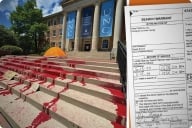You have /5 articles left.
Sign up for a free account or log in.
Part 5
Almost two hundred people watch my poetry lectures now. It's a very global group.Beyond allowing me to think in big terms about an art form I've read, taught, and tried my hand at for decades, my ongoing lecture series, POETRY: WHAT IT IS AND HOW TO UNDERSTAND IT has brought me into the quicksilver world of open courses, where professors broadcast their passions, and where comments come from teenagers in Quito and librarians in Saskatchewan.
There's an undeniable pleasure, for me, in introducing a new technology, a new teaching discipline, a new intellectual presentation, into my life, and in contemplating the actual good I might do by way of a Massive Open Online Course. Who knows where my face and voice and take on poetry go? Maybe I'm of use to some people simply for the standard American I speak - and I like this thought, that my hard R's and native idioms enliven the language study of some kid in Szczecin.
But I also hope that my basic praise of poetry, my case for it as a significant part of a thoughtful life, gets some traction. At the end of my fourth lecture, I quote Josephine Hart (“Poetry has never let me down. Without poetry, I would have found life less comprehensible, less bearable and infinitely less enjoyable.”), and throughout my presentation of poetry as an oblique and beautiful conveyer of truths, I hope I'm making it clear that poetry shouldn't be a coterie phenomenon, despite its difficulty. That the work of deciphering it can be a pleasure.
In clarifying the nature of that pleasure, I move closer with each lecture into the realm of knowledge and morality.
*****************************
Open. The word always seems to convey something good. Open Society Foundations, Open Democracy. Open-hearted. The open air. Open form poetry, for that matter. "The earth expanding right hand and left hand," Whitman writes, in Song of the Open Road. Yet if the MOOC praises openness in its very name - massive openness - it also runs the risk of any open form, which is of course shapelessness, meaninglessness. So open that everything falls out.
After all, in many respects the best education could be said to be, in various ways, closed. In his testy but unforgettable book about teaching - Fellow Teachers - Philip Rieff complains about a student who tells him that from now on we all have to be "up front" with one another, a posture Rieff reckons involves "the idea of a human who exposes himself completely and reveals nothing." Especially when the subject is poetry - which can be a very open form, but which seldom shows its hand openly - or philosophy, or any rather arcane aesthetic, field, or system, you might argue that the tutorial, or the seminar, would be a better way to convey nuance.
Closed classroom form allows teachers to sense, often quite acutely, what their students are taking in, and how they're taking it in. The closed classroom offers physical proximity, immediate vocal response, graphic emotional clues. Over the course of weeks together, it offers people an odd sort of intimacy, a mutual understanding, a way of coming together as intellects and as human beings. If the closed classroom is composed of self-selected students, all of whom have more or less the same preparation and degree of interest in a subject, it's obviously easier to focus upon a particular subject in a particular way. And if, as is often the case, students linger after class to chat with their professor, and with each other, about the subject matter, there's an extra, extemporaneous, yet more personal dimension to what they're learning.
But the massively open form of the freely offered MOOC has its own advantages. Ideally, the MOOC - to paraphrase Emily Dickinson - selects its own society, generates from the nature of its address to the world the international gathering that values it. There's something gratifying and exciting about the absolutely voluntary viewing of a MOOC, the way one's motive is uncorrupted by careerism, degree requirements, the quest for an easy A. There's a corresponding attraction to the purely voluntary offering of a MOOC by an instructor, for whom there might be some ego gratification in getting noticed by a lot of people, but for whom, I think, the main motive involves what I'd call an act of love.
******************************
Udemy, the outfit that produces the Faculty Project MOOC, contacts me occasionally. It's always a madly amiable person with suggestions on things like lessening the echo on my soundtrack. My techie sister handles production issues, so I don't have to think about whether the shot is balanced or the light's weak. I just plunk my notes on the music stand I use for a podium, and talk. Tomorrow (we film one lecture every Saturday) I'll talk about Sunday Morning, by Wallace Stevens.





